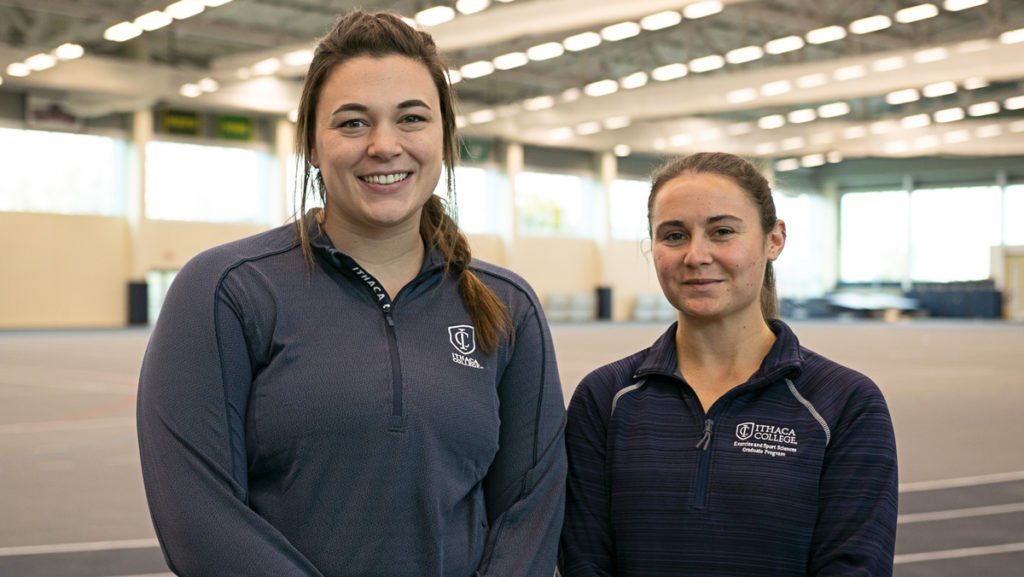Every Sunday evening, members of the Ithaca College women’s track and field team has a meeting with a pair of graduate students who teach it about how to cope with mental challenges as collegiate athletes.
In the exercise and sport sciences graduate program at the college, there is a concentration in sport psychology. The concentration focuses on studying the psychological components that affect participation and performance in sports. Graduate students in this program have an opportunity to work with and teach athletes at the college about mental performance.
Graduate student Rachel Ford, who works with the women’s track and field team, said the process begins by observing the teams and is followed by implementing their own teachings.
“My classmates and I observe practice weekly with our assigned teams to get a better picture of what their sport entails and what their needs for education on mental training might be,” Ford said. “We then organize mental training education sessions to teach mental skills that can be used in their sport.”
Graduate students work with the student-athletes on a wide range of topics. Sessions can focus on effective goal–setting strategies, energy management and managing stress during competitions. Discussions, hands-on activities and worksheets are incorporated to communicate topics with the athletes.
Justine Vosloo is an associate professor in the Department of Exercise Science and Athletic Training. She has taught a variety of courses to graduate students, like “Counseling Student-Athletes” and “Exercise and Rehabilitation Psychology.” Vosloo said the teams have an opportunity to learn new skills and use the same skills in the future.
“For athletes on campus, they gain very real skills,” Vosloo said. “Mental skills training, in a lot of ways, is life skills because being able to deal with failure, learning to be resilient as an athlete, is something that translates over into being resilient on a job.”
The women’s swimming and diving team has worked with the graduate students for the past three years. Head coach Paula Miller said the graduate students allow the team to cater the training to its individual needs.
“Our captains have a lot of say in the program,” Miller said. “During our captains-coaches meeting, if there’s a concern, it might be, ‘Hey, why don’t we bring it up during our mental training?’ and have them approach it that way.”
Amanda Giarratano, a team captain and senior diver, said that discussing mental challenges as a team and learning strategies to overcome them are especially helpful in a sport like diving.
“Most of the time, we do a workshop–style session where they prompt us with questions, and we answer them and bounce off each other,” Giarratano said.
Vosloo said a number of graduate students from the college move on to complete their Ph.D.s. After that, they are able to advance in the field to work for larger institutions. Major League Baseball teams utilize mental performance coaches, as does the United States military. Jesse Michel, who obtained his master’s degree from the college in 2009, is currently a mental skills coordinator for the Houston Astros.
Vosloo said that working with varsity sports teams allows the graduate students to apply what they learn in the classroom to helping college athletes directly.
“They have an opportunity to see things in the field and then to gain insight into how these performers experience the mental challenges that could get in the way of performance,” Vosloo said. “They have the opportunity to observe how to teach mental skills, how to put that into action, so performers can see change in themselves.”
Last year, the graduate students met with the swimming and diving team every two weeks during its season. The team recently opened its 2019 season and will continue to participate in mental training.
“Athletes spend so much time training for the physical side of sport,” Ford said. “Anytime we can get them to understand and learn how their mind influences their body is extremely valuable, and we are excited to see how eager they are to train their minds as well as their physical bodies.”














